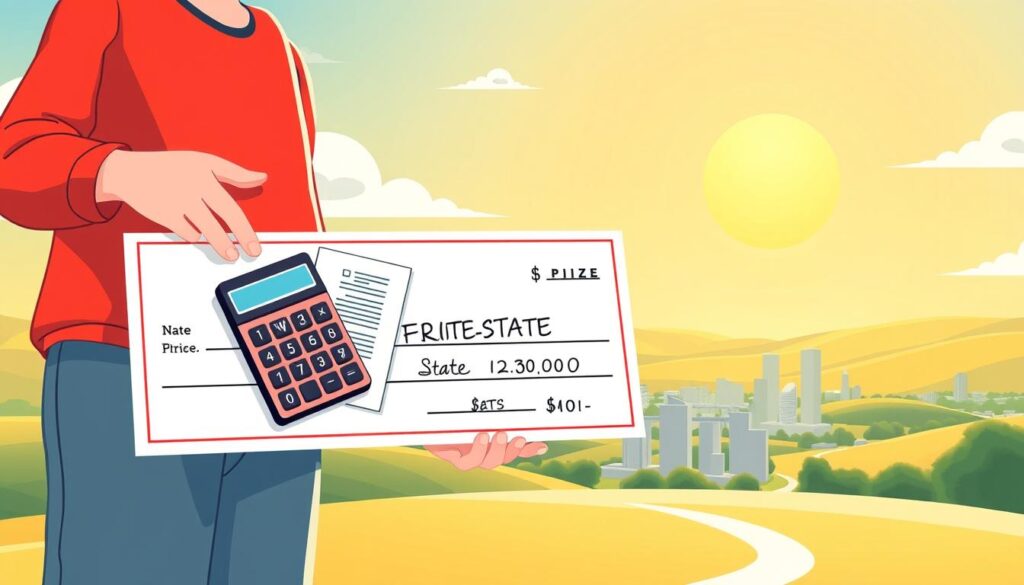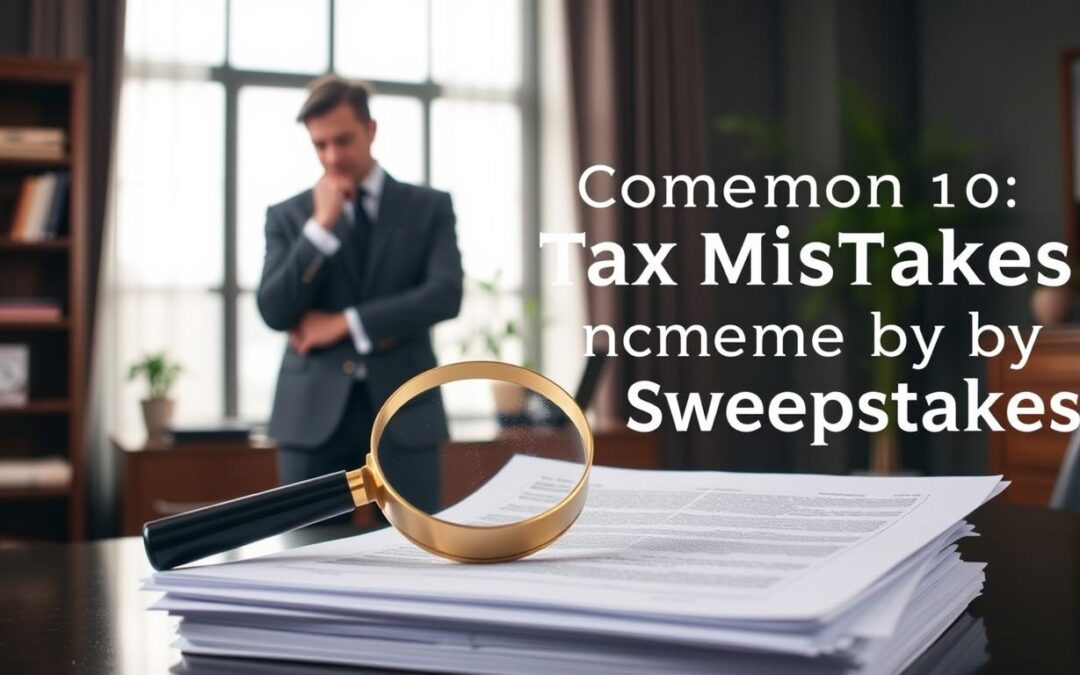Winning a sweepstakes is exciting, but many winners don't know about the tax issues. It's important to know the 10 common tax mistakes to avoid financial problems and IRS issues.
Making tax mistakes with sweepstakes can turn a dream into a nightmare. The IRS sees all winnings as taxable income. This means winners must report every dollar won, no matter the prize's value or type.
Understanding tax advice for sweepstakes winners is key. It involves careful planning and attention to detail. Whether it's cash, cars, or vacations, each prize has its own tax rules. These can surprise those who are not prepared.
Key Takeaways
- All sweepstakes winnings are taxable income
- Detailed record-keeping is essential
- Different prizes have unique tax reporting rules
- State taxes can significantly impact winnings
- Professional tax guidance can prevent costly mistakes
Understanding Tax Obligations for Winners
Winning a sweepstakes is exciting, but it also comes with tax duties. The IRS sees sweepstakes winnings as taxable income. This means you must report these earnings on your tax return.
Sweepstakes tax laws can be tricky. Different rules apply to different prizes. Knowing the tax rules for sweepstakes is key to avoid legal trouble and unexpected taxes.
How Cash and Non-Cash Prizes Are Taxed
Sweepstakes winnings taxes vary by prize type:
- Cash prizes are taxed as income
- Non-cash prizes are taxed based on their value
- Prizes over $600 need a Form W-2G
Reporting Prize Winnings Accurately
The IRS needs detailed records for sweepstakes winnings. Winners must:
- Keep all prize documents
- Report winnings on Form 1040
- Pay federal and state taxes
Accurate reporting helps avoid tax penalties and audits.
Remember, sweepstakes winnings can increase your tax bracket. It's important to plan and consider getting tax advice from a professional.
Not Keeping Accurate Records
Winning sweepstakes is exciting, but managing taxes well is key. Keeping detailed records is the first step. The IRS closely examines prize winnings, so keeping accurate records is crucial.
Good record-keeping is more than just saving winning notifications. Winners need a clear plan to track all financial details of their prizes.
Importance of Documenting Winnings
Good records protect you from tax audits. Make a special file for each sweepstakes win. Include:
- Prize description and exact value
- Date of winning
- Sponsoring organization
- Form 1099-MISC received
- Entry costs (if applicable)
Tracking Related Expenses
Smart sweepstakes players know some contest costs can be tax-deductible. Keep receipts for:
- Postage for contest entries
- Printing costs for forms
- Phone or internet expenses for entering contests
- Travel expenses for prize collection
Pro tip: Digital spreadsheets or dedicated apps can simplify record-keeping and ensure no detail gets overlooked.
With thorough documentation, what could be a tax headache becomes a simple financial task. This helps sweepstakes winners stay on the right side of the law and feel at ease.
Ignoring State Taxes
Sweepstakes winners often forget about state taxes. While everyone talks about federal taxes, state taxes can really add up. They can change how much you owe in taxes for your winnings.

Every state has its own rules for taxes on prizes. The taxes you owe can change a lot based on where you live and where you won the prize.
State Tax Variations Across the United States
State laws on taxes for gambling and sweepstakes winnings are complex. Some main differences are:
- Tax rates vary from 0% to over 13% depending on the state
- Some states don't tax prize winnings at all
- Certain states take a part of your winnings right away
- How much you need to report can differ by state
Implications of Neglecting State Winnings
Not reporting state sweepstakes winnings can lead to big problems. When planning your taxes, you must think about state rules. This helps avoid penalties.
Keeping good records and reporting taxes early are key to handling sweepstakes taxes.
Winners should talk to a local tax expert. They can help understand state tax rules and plan your taxes well.
Miscalculating The Value of Prizes
Dealing with sweepstakes tax mistakes can be hard, especially when figuring out what your prizes are worth. The IRS wants you to report prize values correctly. Knowing how to find the fair market value of prizes is key for tax compliance.
For sweepstakes winners, figuring out prize value is a big deal. Non-cash prizes can lead to big tax problems that many don't see coming.
Determining Fair Market Value
Finding the fair market value of prizes isn't easy. Here are important things to think about for accurate prize valuation:
- Look up the current retail price of the prize
- Think about the condition of non-cash prizes
- Check the prize's actual worth from other sources
- Keep a record of how you valued the prize
Common Valuation Mistakes to Avoid
Sweepstakes winners often make big mistakes when reporting prize values. Some common errors include:
- Thinking the prize is worth more than it is
- Reporting the prize's value too low
- Not getting the right documents
- Not considering how the prize might lose value over time
Pro tip: If you're unsure, talk to a tax expert who knows about prize winnings. They can help make sure you value your prizes right.
Remember, it's your job as a sweepstakes winner to get the prize value right. Making mistakes can lead to audits or penalties from the IRS.
Procrastinating on Tax Filing
Winning a sweepstakes is exciting, but ignoring tax planning can lead to financial trouble. It's crucial for sweepstakes winners to act quickly and wisely to avoid big mistakes.
Putting off tax planning is risky with big prize winnings. The IRS wants taxes on sweepstakes prizes paid on time. This can lead to complex tax issues.
Risks of Last-Minute Tax Preparation
Understanding the dangers of waiting too long is key. Delays can cause:
- Substantial late filing penalties
- Increased risk of audit
- Unexpected tax liabilities
- Potential legal complications
Creating a Strategic Tax Filing Calendar
Good tax management for sweepstakes winners means planning ahead. Here are some important steps:
- Mark quarterly estimated tax payment dates
- Gather documentation right after winning
- Consult a tax professional within 30 days of a big win
- Set reminders for key tax deadlines
Tip: You might need to make quarterly estimated tax payments for big winnings. Don't wait until the annual tax filing deadline.
Proactive tax planning turns potential stress into financial confidence.
Overlooking Deductions and Credits
Winning sweepstakes can bring unexpected financial opportunities. But, many prize winners miss crucial tax-saving strategies. Understanding available deductions and credits is key to maximizing your winnings and minimizing tax liability.

Smart tax advice for sweepstakes winners involves knowing which expenses can potentially reduce your tax burden. The IRS provides several opportunities for tax tips for sweepstakes prizes that many people overlook.
Available Tax Deductions for Prize Winners
Sweepstakes winners can explore multiple deduction possibilities:
- Travel expenses related to claiming prizes
- Costs associated with documentation and record-keeping
- Professional tax preparation fees
- Charitable donations made with prize money
Strategies to Maximize Credits
"Knowledge of tax regulations can transform your prize winnings from a potential financial burden to a strategic opportunity." - Tax Expert
Effective tax planning requires careful documentation and strategic approach. Consider these credit maximization strategies:
- Track all prize-related expenses meticulously
- Consult a tax professional specializing in prize winnings
- Understand potential state and federal tax implications
- Explore potential charitable contribution deductions
Proactive tax management can help sweepstakes winners retain more of their exciting prizes while staying compliant with tax regulations.
Failing to Seek Professional Help
Winning a sweepstakes can lead to a world of tax complexity. Many winners try to handle their taxes alone. This can put them at risk of big financial problems.
Getting tax advice for sweepstakes winners is not simple. Each win has its own tax issues that can get very complicated.
When to Consult a Tax Expert
There are key times when you should get professional tax help:
- Winnings over $5,000
- Getting prizes from different sources in one year
- Prizes that are complex, like real estate or cars
- International sweepstakes with tax issues across borders
"A tax professional can save you more money than their fee by identifying strategic deductions and preventing costly mistakes." - IRS Tax Advisor
Benefits of Professional Guidance
Working with a tax expert brings many benefits:
- Right prize value
- Full tax plan
- Less chance of audits
- Custom financial advice
Getting professional tax advice can really protect your winnings. It also gives you peace of mind during a big financial change.
Confusing Cash Windfalls with Other Income
Winning sweepstakes can be confusing when it comes to taxes. It's important to know how to report sweepstakes winnings taxes correctly. This helps keep your financial records accurate and avoids trouble with the IRS.
Sweepstakes winnings are different from other types of income. The IRS treats them as a special category. Here's what you need to know:
- Sweepstakes winnings are reported as Other Income on tax returns
- Prizes over $600 need a 1099-MISC form from the sponsor
- You must report the full value of the prize, no matter its type
Differentiating Income Types
It's crucial to classify sweepstakes income correctly. Unlike regular income, prize money has its own rules. Winners should document the source, value, and date of their winnings for accurate tax reporting.
Reporting Prize Money Correctly
The tax rules for sweepstakes winnings can affect your taxes. You must report all prizes on your tax return, even if they're not cash. The value of non-cash prizes, like cars or trips, is also taxable.
Pro tip: Keep detailed records of all sweepstakes winnings, including official documentation from contest organizers.
Knowing these tax rules helps sweepstakes winners avoid penalties. It ensures they follow IRS regulations.
Underestimating the Impact of Winnings
Winning a sweepstakes is thrilling, but many forget about the big tax implications. Big prizes can change your financial situation a lot. They might put you in a higher tax bracket and cause unexpected money problems.
Planning your taxes after winning sweepstakes is crucial. A big prize can raise your total income. This means you could pay more taxes on your prize and regular income.
Navigating Higher Tax Brackets
Winning a sweepstakes makes your taxes more complicated. Here are important things to think about:
- Winnings can push you into a higher tax bracket
- Your entire income may be taxed at a higher rate
- Potential loss of certain tax credits or deductions
Strategic Tax Planning Approaches
To deal with the tax effects of winning sweepstakes, try these strategies:
- Consult a tax professional right away
- Understand your new total income threshold
- Plan for possible extra tax
- Think about spreading out big prizes over several years
Smart winners don't just celebrate their prize – they prepare for its financial aftermath.
Being proactive with tax planning can lessen the financial hit from unexpected winnings. By knowing how sweepstakes prizes affect your taxes, you can make smart choices. This helps protect your financial future.
Not Using The Right Tax Forms
Winning sweepstakes can be exciting, but it comes with tax challenges. Choosing the right IRS forms is key to avoid tax mistakes. The correct forms help you report winnings accurately and avoid legal issues.
When you win sweepstakes, you might need to use different tax forms. Knowing which ones to use can help you avoid expensive errors.
Identifying the Appropriate Tax Forms
Winners need to know the IRS forms they must use. The main forms are:
- Form W-2G for gambling and prize winnings over $600
- Form 1099-MISC for miscellaneous prize amounts
- Form 1040 for reporting total annual income
"Accuracy in tax reporting is your best defense against potential IRS audits." - Tax Compliance Expert
Common Filing Errors to Avoid
Winners often make mistakes when filing taxes. Some common errors are:
- Misreporting the total value of prizes
- Failing to report smaller winnings
- Using incorrect form classifications
Pro tip: When in doubt, consult a tax professional who understands sweepstakes tax laws to ensure complete and accurate reporting.
Preparing for Future Wins
Winning sweepstakes is exciting, but smart tax planning is key. Winners know each prize has tax implications that can affect their money. A good plan helps manage taxes and prepares you for more wins.
It's smart to have a savings account for taxes. Experts say to save 25-30% of each prize for taxes. This way, you won't be stressed when tax time comes. Taxes can change based on the prize, so planning is crucial.
Working with tax pros who know about prize winnings is helpful. They guide you through tax rules, find deductions, and create tax plans. Regular talks with them keep you up-to-date on tax changes and improve your sweepstakes strategy.
Good sweepstakes winners see tax planning as part of their strategy. Keeping records, saving money, and getting advice turns tax worries into chances to grow your wealth. Being proactive makes winning a happy moment without financial worries.
